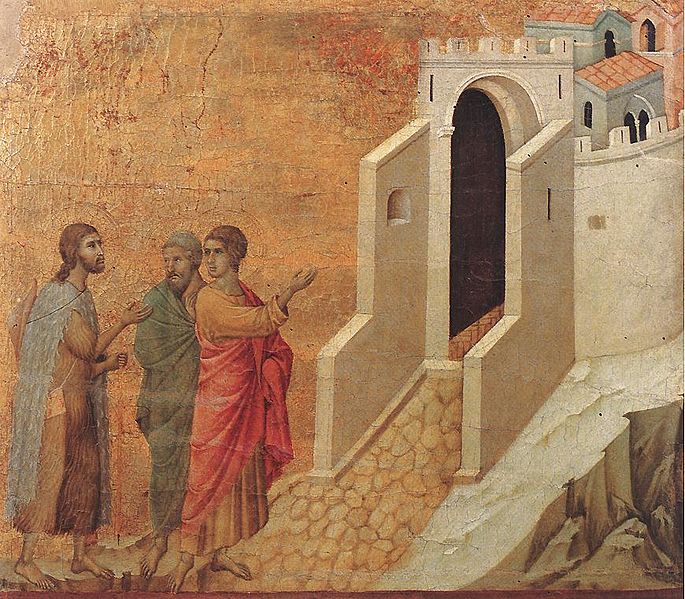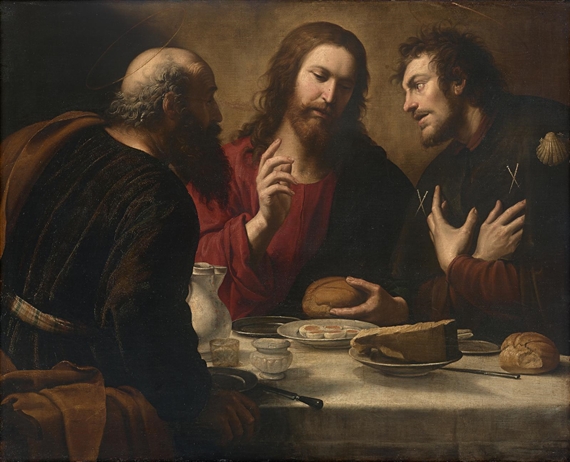28 As they came near the village to which they were going, he walked ahead as if he were going on. 29 But they urged him strongly, saying, “Stay with us, because it is almost evening and the day is now nearly over.” So he went in to stay with them. [Luke 24:28-29, NRSV]
[L] Jesus and the two disciples On the Road to Emmaus, by Duccio di Buoninsegna, 1308–1311. [R] The Supper at Emmaus, by Giuseppe Vermiglio, 1585–1635.
The theme of hospitality or table fellowship enjoys emphasis in Luke’s writing. He views it as a solution to the apparent rift between the rich and poor, high and low, and between Hebrews and Hellenists (see, e.g., Acts 6:1-3). Hospitality is for Luke a symbol of Christian unity. In the Emmaus story, Luke hinges the disciples’ offer of hospitality as the key that aids them in their progress from meeting a stranger on their journey to Emmaus, to encountering the Risen Lord at table fellowship. Hospitality, in other words, stands at the origin of revelation at the breaking of the bread.
- In Luke’s writings, the practice of hospitality is a prism through which Jesus’ disciples can view one another and others as valuable children of God, and a channel through which they can establish relationships with travelers and strangers.
Hospitality
Pope Francis has often highlighted the centrality of hospitality, considering it an important ministry. On this, he spoke highly of Martha’s ministry of hospitality in welcoming Jesus to her home in Bethany (Luke 10:38). In other settings, the Holy Father stresses that gratitude to God should lead to hospitality to neighbours as well as migrants, and to fellow Christians in other denominations. He considers hospitality an important ecumenical virtue. To him, the Church must be a place where the language of hospitality is in the reception and respect for each person’s differences.
- “It is about turning from the path of selfishness, conflict, division and superiority, and taking instead the path of life, generosity and love. It is about passing from a mentality which domineers, stifles and manipulates to a mentality which welcomes, accepts and cares“.
- It’s a call to be more welcoming towards all, including those from different confessions, and it’s something that belongs to the tradition of all Christian communities and families.
In Luke’s world, hospitality meant the sharing of a meal, an expression of friendship. Plato (424-347 BC), an Athenian philosopher living in the Classical period in Ancient Greece, had written about meals as a way of making friends rather than enemies. Another Greek philosopher and a priest as well by the name of Plutarch (ca. 46-110 AD), writing around the time of Luke, said: “A guest comes to share not only meat, wine, and dessert, but conversation, fun, and amiability that leads to friendship.” On one point, Luke and Plutarch strike a similar tone:
- Luke quotes Jesus advising dinner guests not to choose exalted seats, “For everyone who exalts himself will be humbled, and he who humbles himself will be exalted”, and a dinner host to invite the poor who cannot repay him rather than the rich who can, so that he “will be repaid at the resurrection of the just” (Luke 14:7-14).
- Plutarch, too, was negative towards the practice of seating guests at meals according to status, on ground that it worked against table fellowship.
For Luke, hospitality as a symbol of Christian unity is clear in the emphasis he placed on Jesus accepting the hospitality of the socially unacceptable and in Jesus occasionally playing host at meals of his followers. For example, Jesus ate with Zacchaeus the tax collector (Luke 19:1-10) and played host at a meal in Emmaus (Luke 24:28-35). Likewise, in the early church, Gentiles’ acceptance into Church was often marked by a celebration over table fellowship. We see this in Peter’s action when, after learning that Jewish followers of Jesus may accept the hospitality of Gentiles (Acts 10:28-29), went to the home of Cornelius to facilitate his joining the followers of Jesus, staying ten days (10:48). Paul and his companions, too, accepted the hospitality of Lydia (16:14-15) and the Philippian gaoler (16:34).
In the Emmaus story, Luke so accentuates the centrality of hospitality that his readers cannot miss the point that it is the care, consideration and hospitality the two disciples from Emmaus showed to the stranger that they ripped the reward of Christ opening their eyes and appeared to them. They invited the stranger to stay the evening with them. Just before that, the Risen Lord appeared like he was going further, for he would not inconvenience the two nor force himself upon them. As Christ awaited their invitation to come in, William Barclay rightly alerts us to the gift of free-will. Calling it the most perilous gift in the world, Barclay reminds us of the immense significance in its use: we can use it to invite Christ to enter our lives or to allow him to pass on (William Barclay, Luke, 295).
From Hospitality to Sacrament
“They invited the stranger…” Those words hold an indispensable key. After doing a wonderful Bible study with the two disciples, the Risen Lord made it look like he is going further. He waits for them to invite him in. This is ministry and evangelization 101: Once we have opened the topic of religion and made our case for the faith, then it is still up to our listeners whether or not to continue that conversation; we must be patient and respectful. We must not force the faith on others. Instead, we do well to always be prepared to give people time and to even give people the right to decline to accept what we have said.
In Luke’s narrative, we do get a positive outcome this time. The two disciples did invite the Risen Jesus in, partly because they were attracted by Jesus’ Word on the road and want to continue that conversation; indeed they will later realize that their hearts were burning with great excitement when he spoke on the road. But the point for ministry and evangelization is really that after listening to the Word and accepting it, the disciples are ready for the sacrament – that which the Church defines as an outward (mere physical) sign of an inner (depth spiritual) grace and truth. People’s hearts might burn when we share the Scriptures with them, but they will really know Jesus in the breaking of the bread. It is not enough to rest on the assurance that we have warned people off some of the bigger sins in modern life. Our work, essentially a work of witnessing for the Lord, is not done until we have led them to an encounter with the Lord himself – the Word of God who dwells among us in the community of faith gathered in his name, in Scriptures, and in the Body-broken-to-be-shared.
“Stay with Us, Lord”
In The New Wine (1994), Carlo Maria Martini, the late Cardinal Archbishop of Milan, speaks to families, encouraging them to be the foundation of society, a school of authentic humanity, and witnesses to belief in and love of Christ. We join him on a topic from this book which is germane to our present topic. He holds the firm impression that it is a common opinion of people, especially Christians, that there is a great liking for the figure of Jesus of Nazareth. Of this he writes: “Everyone knows, at least vaguely, the purity of his message, his preference for the poor and the lowly, the consistency between his life and words, from the grotto of Bethlehem to the dramatic poverty of the cross.”
However, Martini suggests that to complete the itinerary of our human life, we need to pass “from a simple human attraction to Jesus to faith in the Son of God, who saves us through his death and resurrection.” To do so, we must ask Jesus to accompany each one of us, as he accompanied the two disciples from Emmaus. We need to constantly beseech Jesus, “Stay with us, Lord”, and ask him to strengthen our faith in the myriad matters of importance in life’s journey. Knowing “the uncertain shadows of our thoughts about the meaning of life” and conscious of “the sinful ambiguity of our behavior towards the dignity and freedom of each person,” Martini calls us to always invoke the presence of the Risen Christ, for in him alone, we find the truth and hope for our life.
This is all the more important, Barclay suggests, when we have a tough day and feel beaten and not in the mood for inviting a dinner guest. He quotes Fay Inchfawn:
Sometimes, when everything goes wrong;
When days are short and nights are long;
When wash-day brings so dull a sky
That not a single thing will dry.
And when the kitchen chimney smokes,
And when there’s naught so ‘queer’ as folks!
When friends deplore my faded youth,
And when the baby cuts a tooth.
While John, the baby last but one,
Clings round my skirts till day is done;
And fat, good-tempered Jane is glum,
And butcher’s man forgets to come.
Sometimes I say on days like these,
I get a sudden gleam of bliss.
Copyright © Dr. Jeffrey & Angie Goh, May 2021. All rights reserved.
You are most welcome to respond to this post. Email your comments to jeffangiegoh@gmail.com. You can also be dialogue partners in this Ephphatha Coffee-Corner Ministry by sending us questions for discussion.


